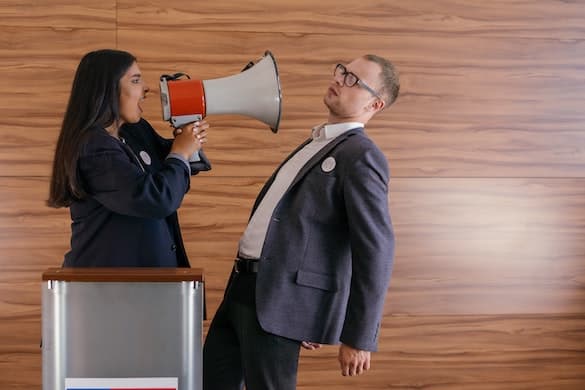The Cocktail Party Contrarian: Hysteria, Hyperbole, and Hate Speech
We are all so hysterical about other people’s opinions that to avoid mass cardiac episodes while watching partisan cable news channels, we have created an entirely false category called ‘hate speech.’

During a ladies’ luncheon the other day the speaker, a conservative political pundit, offended a certain percentage of the liberal women in the audience with talk of a Republican “tsunami” in the midterm elections. As I was leaving, I shared the elevator with a woman I know. “I feel like I was just opinion raped,” she exclaimed in lieu of “hello,” steam coming out of her ears.
If I didn’t know better than to throw fuel on a fire, I might have replied that I was, in that moment, feeling “hyperbole raped,” but it seemed like a bad idea to call anything “rape” that wasn’t. This woman reminded me of so many teenage girls who say they “literally had the worst day ever” three times a week. Dramatic flair doesn’t work so well when everything is dramatic. I am sure it wasn’t this woman’s idea of a good time to hear that her preferred political party was going to lose control of the House on an otherwise pleasant afternoon, but she may have been overreacting just a bit.
Everyone needs to calm down. Hearing things we don’t like, and even hearing things we literally hate, literally won’t be the end of us. Hyperventilating when we do might. We are all so hysterical about other people’s opinions these days that to avoid mass cardiac episodes while watching partisan cable news channels, we have actually created an entirely false category called “hate speech” just so we can justify our crazed attempts to erase speech we personally hate and bring down our blood pressures.
“Hate speech” isn’t a legal category in America, it is a drug. It is the new Clonazepam that delicate people manufacture to put under their tongues when they hear Ben Shapiro’s voice. The calming effects are felt within 15-20 minutes, just as social media has spread the word and cancellation of the “hate-speaker” begins.
The problem is, narcotics often don’t work as well as advertised and can become addictive. People who hate “hate speech” the most still seem pretty charged up when they pop that pill and hatefully condemn those they accuse of trafficking in it. The relief felt, once a speaker is successfully banned from a campus, is short lived, and another dose of “hate speech” happy pills is required.
A tolerance is built up to prior dosages, and addicts require more medicine to calm their fears about professors who misgender their students. The war on “hate speech” is always ratcheting up, never down, just like everyone’s temper. Irritability is a common side effect of certain drugs as well.
Creating an actionable category for language was never about doing away with “hate” and always about trying to gain control. For the cynical political, tech, corporate, and media classes, convincing people that “hate speech” is a thing was always about gaining power. For the millions of Americans who bought into the idea, it seems to be about regaining power over their own emotional state.
Yet everyone knows drugs are not the answer. Ice cream is. If that woman in the elevator had just grabbed dessert on her way out of the luncheon, she might have laughed off the terrible “assault” she had just endured.

